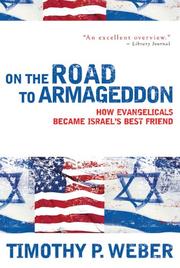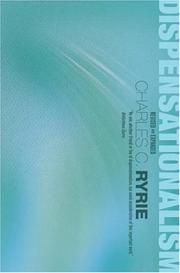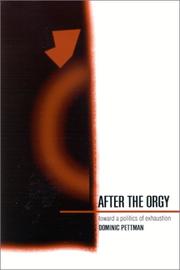| Listing 1 - 10 of 71 | << page >> |
Sort by
|
Digital
Year: 1520 Publisher: Parisiis Venundantur per Tossanåu Denis bibliopolam
Abstract | Keywords | Export | Availability | Bookmark
 Loading...
Loading...Choose an application
- Reference Manager
- EndNote
- RefWorks (Direct export to RefWorks)
Book
Year: 1699 Publisher: London : Printed for Daniel Brown, Jonath. Robinson, Andrew Bell, John Wyat, and E. Harris,
Abstract | Keywords | Export | Availability | Bookmark
 Loading...
Loading...Choose an application
- Reference Manager
- EndNote
- RefWorks (Direct export to RefWorks)
eebo-0018
Religion --- Dispensationalism --- History. --- Spencer, John,
Book
ISBN: 9781514001127 1514001128 9781514001134 Year: 2022 Publisher: Downers Grove IVP Academic
Abstract | Keywords | Export | Availability | Bookmark
 Loading...
Loading...Choose an application
- Reference Manager
- EndNote
- RefWorks (Direct export to RefWorks)
How do the Old and New Testaments relate to each other? What is the relationship among the biblical covenants? In this volume in IVP Academic's Spectrum series, readers will find four contributors who explore these complex questions, each making a case for their own view and responding to the others' views to offer an animated yet irenic discussion on the continuity of Scripture.
Covenant theology --- Dispensationalism --- Bible --- Criticism, interpretation, etc.
Book
ISBN: 0802818080 Year: 1980 Publisher: Grand Rapids (Mich.): Eerdmans
Abstract | Keywords | Export | Availability | Bookmark
 Loading...
Loading...Choose an application
- Reference Manager
- EndNote
- RefWorks (Direct export to RefWorks)
Covenants --- Dispensationalism --- Law and gospel --- Religious aspects --- Christianity

ISBN: 0801031427 Year: 2005 Publisher: Grand Rapids, MI Baker Academic
Abstract | Keywords | Export | Availability | Bookmark
 Loading...
Loading...Choose an application
- Reference Manager
- EndNote
- RefWorks (Direct export to RefWorks)
evangelicalism --- judaism --- relations between religions --- Israel --- Armageddon --- dispensationalism
Periodical
ISSN: 21661545 Year: 2006 Publisher: Fort Worth, Tex. : Tyndale Theological Seminary,
Abstract | Keywords | Export | Availability | Bookmark
 Loading...
Loading...Choose an application
- Reference Manager
- EndNote
- RefWorks (Direct export to RefWorks)
Dispensationalism --- Theology --- Dispensationalism. --- Theology. --- Christian theology --- Theology, Christian --- Dispensational theology --- God (Christianity) --- Theology, Dispensational --- Dispensations --- Christianity --- Religion --- Theology, Doctrinal

ISBN: 9780802421890 Year: 2007 Publisher: Chicago Moody Publishers
Abstract | Keywords | Export | Availability | Bookmark
 Loading...
Loading...Choose an application
- Reference Manager
- EndNote
- RefWorks (Direct export to RefWorks)
the Christian world --- Charles Ryrie --- classic dispensationalism --- covenant theology --- historical premillennialism --- ultradispensationalism --- progressive dispensationalism --- the Bible --- John Nelson Darby (1800-1882)
Book
ISBN: 1421431750 1421431777 1421431769 Year: 2019 Publisher: Johns Hopkins University Press
Abstract | Keywords | Export | Availability | Bookmark
 Loading...
Loading...Choose an application
- Reference Manager
- EndNote
- RefWorks (Direct export to RefWorks)
Originally published in 1975. The French Revolution generated a wave of popular piety and religious excitement in both France and England, where millenarians—prophets of the millennium—attempted to interpret the Revolution as the fulfillment of the predictions of Daniel and St. John the Divine. This study discusses the millenarian ideal in the context of the intellectual and religious attitudes of the time. Rejecting interpretations of millenarianism that chalk it up to class struggle or mass hysteria, Garrett stresses the interaction between politics and religion, viewing the phenomenon as the interpretation, by a varied assortment of individuals, of coincident political events in eschatological terms. Faced with a change as significant as the French Revolution, people found in the prophetic books of the Bible an understanding of what was happening to them. If the Revolution was God's will, if its development had been foretold, then surely the final outcome would be beneficial, at least for the faithful. Political events became eschatological events, and dangers and misfortunes became simply the chastisements that a fallen world must undergo before the Second Coming of Jesus Christ can redeem it. Although some of the beliefs may now seem bizarre, Garrett shows that, at the time, they attracted many followers for whom these ideas were both reasonable and respectable. Focusing on the careers of three millenarians—Suzette Labrousse, Catherine Théot, and Richard Brothers—Garrett tries to understand these prophets as persons rather than dismiss them as fanatics. Their prominence resulted from their success in transmitting a new political consciousness through familiar religious imagery. While the Revolution gave urgency and tangible reality to millenarian convictions, Labrousse, Théot, and others were convinced, well before the Revolution, that they were the bearers of divine revelations and thus welcomed the Revolution as confirmation of their own missions.
Millennialism --- France --- History --- Amillennialism --- Chiliasm --- Millenarianism --- Millennianism --- Postmillennialism --- Premillennialism --- Dispensationalism --- Fundamentalism --- Millennium (Eschatology) --- European history

ISBN: 0791488497 0585476136 9780585476131 0791453960 9780791453964 0791453952 9780791453957 9780791488492 Year: 2002 Publisher: Albany : State University of New York Press,
Abstract | Keywords | Export | Availability | Bookmark
 Loading...
Loading...Choose an application
- Reference Manager
- EndNote
- RefWorks (Direct export to RefWorks)
Applying Jean Baudrillard's question "What are you doing after the orgy?" to the postmillennial climate that informs our contemporary cultural moment, this book argues that the imagination of apocalyptic endings has been an obsessive theme in post-Enlightenment culture. Dominic Pettman identifies and examines the dynamic tensions of various apocalyptic discourses, from the fin-de-siècle decadents of the 1890s to the fin-de-millènnium cyberpunks of the 1990s, in order to highlight the complex constellation of exhaustion, anticipation, panic, and ecstasy in contemporary culture. Through analyses of rapturous cults, cyberpunk literature, post-apocalyptic cinema, techno-paganism, death fashion, and the Y2K prophecy, After the Orgy explores why the twentieth century swung so violently between the poles of anticipation and anticlimax. In the process, the book raises pressing questions concerning the relevance of such ideas in our new millennium and points out alternatives to the monotonous horror of traditional narratives.
Civilization, Modern --- Millennialism. --- Amillennialism --- Chiliasm --- Millenarianism --- Millennianism --- Postmillennialism --- Premillennialism --- Dispensationalism --- Fundamentalism --- Millennium (Eschatology)
Book
ISBN: 0190882700 9780190882709 Year: 2018 Publisher: New York: Oxford university press,
Abstract | Keywords | Export | Availability | Bookmark
 Loading...
Loading...Choose an application
- Reference Manager
- EndNote
- RefWorks (Direct export to RefWorks)
Apocalyptic millennialism is one of the most powerful strands in evangelical Christianity. It is not a single belief, but across many powerful evangelical groups there is general adhesion to faith in the physical return of Jesus in the Second Coming, the affirmation of a Rapture heavenward of "saved" believers, a millennium of peace under the rule of Jesus and his saints and, eventually, a final judgement and entry into deep eternity. In Discovering the End of Time (2016) Donald Harman Akenson traced the emergence of the primary packaging of modern apocalyptic millennialism back to southern Ireland in the 1820s and '30s. In Exporting the Rapture, he documents for the first time how the complex theological construction that has come to dominate modern evangelical thought was enhulled in an organizational system that made it exportable from the British Isles to North America-- and subsequently around the world. A key figure in this process was John Nelson Darby who was at first a formative influence on evangelical apocalypticism in Ireland; then the volatile central figure in Brethren apocalypticism throughout the British Isles; and also a crusty but ultimately very successful missionary to the United States and Canada. Akenson emphasizes that, as strong a personality as John Nelson Darby was, the real story is that he became a vector for the transmission of a terrifically complex and highly seductive ideological system from the old world to the new. So beguiling, adaptable, and compelling was the new Dispensational system that Darby injected into North-American evangelicalism that it continued to spread logarithmically after his death. By the 1920s, the system had become the doctrinal template of the fundamentalist branch of North-American evangelicalism and the distinguishing characteristic of the bestselling Scofield Bible.
Dispensationalism --- Evangelicalism --- Church history --- Darby, J. N. - (John Nelson), - 1800-1882.
| Listing 1 - 10 of 71 | << page >> |
Sort by
|

 Search
Search Feedback
Feedback About UniCat
About UniCat  Help
Help News
News